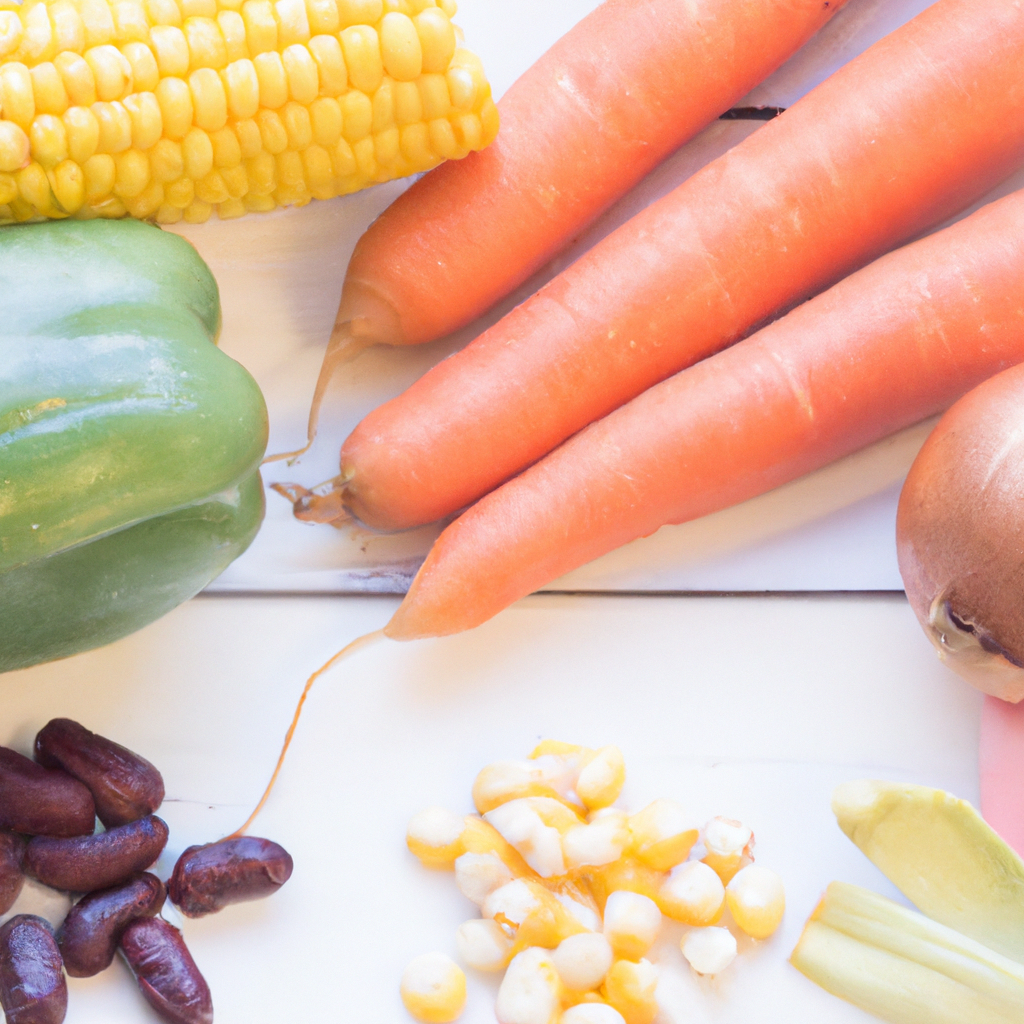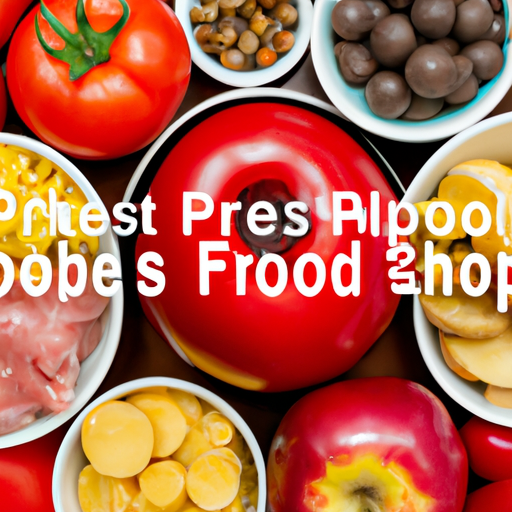Good nutrition is essential for keeping your heart as healthy and strong as possible. Several foods, in particular, have been linked to lower blood pressure, and adding them to your diet can help you maintain healthy numbers. From fresh-caught fish to crunchy nuts, this article will walk you through some smart food choices if you’re looking to keep your blood pressure levels in check.
1. Power Up Your Diet: Smart Foods to Prevent High Blood Pressure
High blood pressure is a dangerous condition that can be prevented through smart diet and lifestyle choices. Here are some foods to power up your diet for better health:
- High-fiber foods: Eating high-fiber foods like beans, legumes, oats, and apples can help lower your blood pressure.
- Leafy greens: Leafy green vegetables like spinach, Swiss chard, and collards contain healthy minerals and vitamins that can help reduce high blood pressure.
- Healthy fats: Healthy fats are essential for lowering your blood pressure. Foods like avocadoes, nuts, and olive oil are great sources of healthy fats.
- Berries: Berries contain disease-fighting nutrients and antioxidants that can help reduce inflammation and lower blood pressure.
In addition to these power foods, incorporating exercise, lowering salt and alcohol intake, and eliminating smoking can make a huge difference in lowering your blood pressure and improving your health overall.
2. Eating Right to Beat Hypertension: How to Make Smart Food Choices
Making smart food choices is essential to managing hypertension. Here’s what you need to know to make those better health decisions.
- Vary your diet: Eating different types of lean proteins, whole grains, fruits, vegetables, and low-fat dairy products can help lower blood pressure. Eating the same foods every day may not provide your body with the nutrition it needs.
- Limit sodium intake: Too much sodium can lead to elevated blood pressure. Read nutrition labels for sodium content, and look for low-sodium options. Avoid adding additional salt to dishes, and opt for spices to flavor your food instead.
- Limit alcohol consumption: Too much alcohol can increase blood pressure. In general, limit consumption to one drink per day for women, and two per day for men.
You should also avoid foods high in saturated fat and cholesterol, as these can raise your LDL cholesterol levels, and cut back on caffeine. Eating a balanced diet that focuses on nutrient-rich and heart-friendly meals is the best way to keep your blood pressure in check.
3. Balanced Nutrition for Optimal Health: Healthy Alternatives for High Blood Pressure
Making Smart Food Choices
Having high blood pressure can put you at higher risk for heart disease and stroke, which is why it’s important to make smart food choices. To lower your blood pressure, opt for nutritious foods that are rich in potassium, fiber, calcium, and magnesium. Leafy greens like kale and spinach are an excellent option, offering a host of vitamins and minerals that help protect your heart. Foods such as:
- Low-fat dairy products
- Berries
- Whole grains
- Skinless poultry
- Fish
can significantly improve your numbers. Additionally, make sure to reach for heart-healthy fats like salmon, nuts, seeds, and avocados. Keeping a well-rounded and balanced diet is essential for maintaining good health.
What to Avoid
When it comes to high blood pressure, what you don’t eat can be just as important as what you do eat. Foods with too much fat and sodium are best to stay away from. Trans fats, found in margarines, commercially-baked goods, fast food, and deep-fried foods, can raise your bad cholesterol and worsen your heart health. Numerous processed foods are also loaded with salt and should be avoided.
In order to keep your blood pressure in check, try to limit or cut out red meat, sugary foods and drinks, and processed snacks. Drinking alcohol in moderation is also beneficial for managing blood pressure levels, but beware of overdoing it.
4. Indulging Your Tastebuds: Delicious Choices for Healthy Blood Pressure Levels
When it comes to maintaining healthy blood pressure levels, making the right dietary choices can be a real game-changer. With nutrient-rich foods, you can keep balanced sodium and potassium levels, while also enjoying delicious meals and snacks. Here are some of our top picks:
Fruits:
- Berries, such as strawberries, blueberries, and raspberries
- Bananas
- Citrus fruits, like oranges, grapefruits, and lemons
Vegetables:
- Broccoli
- Kale
- Spinach
- Beets
These nutrient-packed delicacies make the perfect meal accompaniments or snacks that can be savored every day. Besides their health benefits, these items are also known for their distinctive flavors and textures that make meal times fun and exciting. Furthermore, you can easily include these foods in your favorite recipes, to create your own version of healthy and enjoyable meals.
Q&A
Q: What are some foods that are good for high blood pressure?
A: Foods that are low in sodium, high in potassium and contain healthy fats are excellent choices for people with high blood pressure. Heart-healthy fruits and vegetables, including leafy greens, berries, avocados, and tomatoes, can help keep blood pressure levels in check. Whole wheat bread, oats, nuts, and fatty fish such as salmon and mackerel are also beneficial.
Q: Are there any foods that should be avoided?
A: Foods that are high in sodium, as well as fried and processed foods, are best avoided, as these can increase blood pressure levels. Alcohol should also be avoided, as it can put extra strain on the heart and increase blood pressure.
Q: Are there any other tips to keep in mind for people with high blood pressure?
A: Staying active and getting enough rest are also important for maintaining healthy blood pressure levels. Eating small, frequent meals throughout the day can help keep blood pressure levels in check, as can limiting caffeine intake. Finally, staying hydrated is essential for helping to maintain healthy blood pressure levels.
Living with high blood pressure can sometimes be difficult, however, with some mindful decisions in the food you eat, you can take easy steps to protect your heart and your health. Dr. Stephanie Smith, a cardiologist with Northside Hospital, would suggest that those looking for more guidance to speak to a medical professional, such as a doctor, nutritionist or dietician to create a diet that will suit their individual needs. Be proactive and make smart choices for your heart: the benefits will be worth it.
When it comes to maintaining your overall health, having control over high blood pressure is paramount. While medicine can be effective in managing the condition, choosing the right foods can also have a big impact. A diet that is filled with minerals, vitamins, fruits, vegetables, and lean proteins may help to keep your blood pressure down.
Studies have found that the DASH diet, which stands for Dietary Approaches to Stop Hypertension, is one of the best for controlling high blood pressure. This diet includes whole grains, low-fat dairy, vegetables, fruits, fish, poultry, and nuts. Other choices that are good for lowering blood pressure include lean meat (such as chicken and fish) as well as low-fat dairy products, such as yogurt and skim milk. Eating a variety of fruits and vegetables, as well as whole grains, is key to a healthy diet.
In addition to these healthy choices, it is also important to limit high-sodium foods. These include processed meats, pickles, canned soups, and canned vegetables. Instead, opt for fresh options such as vegetables, fruits, and lean proteins. Also, try to limit your intake of processed foods and added sugars.
Foods that contain healthy fats, such as olive oil, can also be beneficial when it comes to lowering blood pressure. These healthy fats are often found in foods like fish, nuts, and avocados.
Finally, it is important to note that caffeine can have an effect on blood pressure, so consider limiting your intake of caffeine-containing foods and drinks.
Overall, making smart food choices can have a positive effect on your blood pressure. By following the DASH diet and opting for foods such as vegetables, fruits, lean proteins, and healthy fats, you can keep your blood pressure in check. Additionally, limiting your intake of high-sodium foods, processed foods, added sugars, and caffeine can also help to control your blood pressure.
